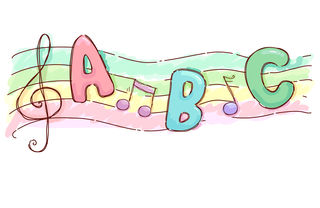Education
Now I Know My ABCs. Tell Me What You Think of Me!
Learning the alphabet is actually pretty complex.
Posted October 10, 2018

It’s fall, and school is in full swing here in Athens, both in the city and at the University. A high-poverty local school has asked some of our education undergraduates to help them teach a group of Kindergarten students their alphabet and read books to the children. Studies have shown that most children in the United States come to Kindergarten knowing their letters; in fact, around two-thirds of kids can name the letters from the moment they enter the schoolhouse door. Most can also write their name. But these kids can’t, so working with these children on the alphabet would seem like a perfect topic on which both the undergraduates and children can begin their academic year.
Many of the children we support come to this school with some obstacles to learning (e.g., low family income and education levels, struggling single parent families), and some live in quite stressful conditions. Some of these families have taken the advantage of the free state lottery-funded prekindergarten program, but a surprising number have not. In fact, only around one-third of children in the U.S. attend preschool, where programs often focus on print and the alphabet. Probably most of these kids who don’t yet know their alphabet have not attended preschool and may have limited emergent literacy skills for a variety of reasons, so they have a lot of ground to make up.
To some of these Kindergarteners, written text and the letters that make it up are an unplumbed mystery. Observing the children’s efforts as they struggle mightily to learn simple letter names, it strikes us just how hard they have to work to learn this skill. This is especially true if they lack other emergent literacy skills like phonological awareness or an understanding what text is for and how it is generally used. Yet, learning the alphabet is a key milestone for kindergarten children, and it is a necessary step toward learning to read. So learn the alphabet they must, no matter how difficult.
You may be thinking, “Hey, Drs. S & K! There are only 26 letters, so how hard can this really be? Aren’t you making a mountain out of a molehill?” You have a point – we suppose it could be worse. The children could be learning Sanskrit, which has 53 letters. Or Chinese, which has an estimated 50,000+ characters, though you only need 2,000-3,000 of these to read a basic newspaper. Still, even in English, alphabet knowledge is not as simple as it seems. Let’s take a look at some of the elements involved.
If their child can sing the ABC song from memory (an example of recitation knowledge), many parents believe that their child has “learned” their ABCs. The issue here comes in the form of what might be called the "elemeno problem." You may remember learning this familiar childhood song, and thinking at first that "elemeno" was the name of a single letter (the one right after "kay" and before pee). Unfortunately, many children don’t realize for quite some time that "elemeno" actually refers to the separate letters L, M, N, and O. Though learning the ABC song is a great tool for alphabetizing later, it’s pretty clear that recitation knowledge ≠ letter knowledge.
Then there is letter name knowledge. Letter name knowledge refers to a child's knowledge, for instance, that the letters B and b are both called “bee,” C and c are called “cee,” and so forth. Notice that we have now had to expand the number of distinct forms a child has to master from 26 to 52, as children must learn to distinguish both upper and lower case letters. Many parents, and some teachers, resort to flashcards to promote this type of learning, but there are also many wonderful alphabet books that can be used, and these have the advantage of teaching children to recognize letters in the context of real print (since few of us will ever need to read flashcards, outside of school).
In addition, it’s not 100% clear whether having letter name knowledge is all that important-- it’s not immediately obvious that you really need this knowledge to learn how to read. Do you really need to know that the letter S is named “esss” in order to read a word that begins with S? Probably not, and so not all schools bother to teach letter names. Research does suggest that most children who know their letter names at Kindergarten entry tend to learn to read words pretty easily, but it seems likely that the advantage of knowing your letter names at Kindergarten entry comes not so much from knowing the names, but rather from the fact that someone has bothered to teach them to you. Such kids have probably been lucky enough to grow up in a home that highlighted the importance of reading, so they probably have been given books and been read to from an early age and had many other experiences that tend to promote emergent literacy. Knowing those letter names is more-or-less diagnostic, and such kids’ transition into actual reading usually goes smoothly.
Letter-sound knowledge, the ability to say the sound that a letter makes, rather than its name, is probably the most important type of alphabet knowledge for reading. Kids with letter-sound knowledge know that V makes the sound “vvvv” rather than“veee.” Fortunately, in English, most of the letter names contain within them the sound that the letter makes, so knowing letter names can help a child make the connection between the way a letter looks, its name, and its sound. Because the letters H, W, and Y do not contain their letter sound within their names, these letter names can be a source of confusion at first, and we often hear kids mistake Y as making the “whuh” sound. As children learn to connect the letter sounds to what the letter looks like, their left occipital-temporal cortex becomes sensitive to print-- the first sign that the brain is now dedicating some of its functions to reading.
If a child has unusual difficulty in learning letter sounds, this could be really important, particularly if there is no other reason for the difficulty (such as low attention to literacy in the home, inability to pay attention, and so forth). Sometimes, this difficulty serves as a clue that the child might have an often inherited problem that might require special attention. Indeed, in our experience, we can almost pick out the children who will struggle in reading later, based on this skill. But it is vital to note that, in nearly all cases, with the right help, these children can later go on to read just fine, although they will start out more slowly and could even end up reading more slowly and with greater effort as an adult.
Finally, there is letter writing. Learning to write (print) letters while tackling all the rest of this might seem like overload, but writing the letters can actually help kids knit together all this knowledge so it can be used for reading. Writing letters helps the parts of the brain dedicated to recognizing objects learn to recognize print. As we coach our undergraduates to help their tutees, we emphasize that they should urge children to write the letters down rather than just having them passively name them; and we tell them not to be critical about how well they are written. We make sure that they understand that children’s handwriting will vastly improve throughout the year, since at this age fine motor skills are still developing, especially in boys--certainly, no need to worry about poor handwriting yet.
So, what does any of this mean for the task ahead as our undergraduate educators help our Kindergarteners get off on the right foot in reading? Well, even though it may sound like a small task to teach the alphabet, it is an important and multi-faceted one. And alphabet knowledge is definitely a case where a little bit of knowledge goes a long way. If all goes according to plan, by Christmas, our future teachers should have helped their tutees get much of this knowledge behind them, so the children can get on with the regular business of learning to read.




